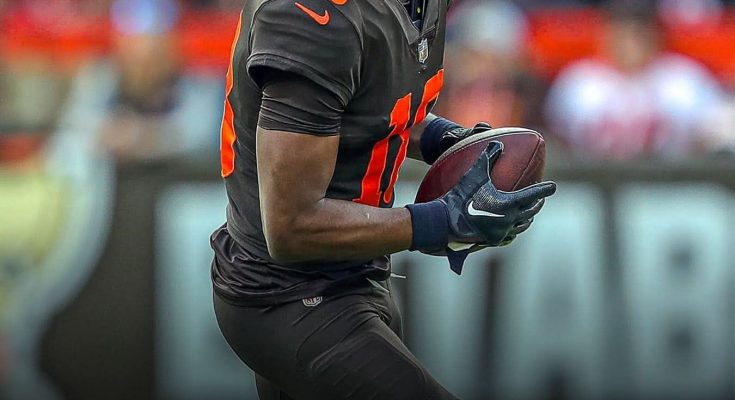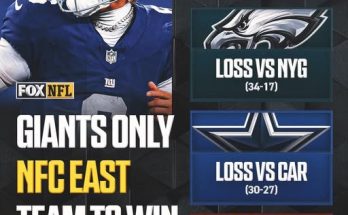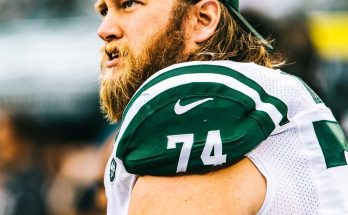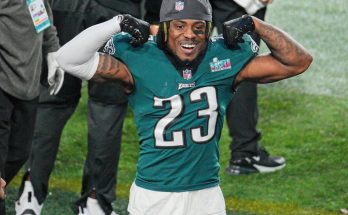This is a sad moment in the NFL, and especially for Browns fans, because David Bell’s retirement feels like what it is — a wrenching end to a career still in its infancy. But above and beyond any fan reaction or team calculus, the primary, human truth is that Bell is making a decision no athlete ever wants to make: stepping away for health, for survival, for the chance to live more fully beyond football.
Bell’s announcement came via social media, in a tone equal parts candid, somber, and appreciative. He said he had been “blindsided by an off‑field injury that was beyond my control,” and after consulting with medical experts and praying, he’s come to accept that continuing to play would “literally risk life and limb.He noted that retiring is the last thing he would otherwise want to do, but that the decision is necessary. (SI) He closed by expressing gratitude — to the Browns organization (from ownership to the medical staff), to his family, to his community, to the fans — and by saying he intends to take what football taught him into his next chapter
The timeline here merits reflection. Bell was drafted in 2022, in the third round, 99th overall. Over his NFL tenure, he appeared in 32 games, including six starts, hauling in 41 receptions for 408 yards and three touchdowns. His rookie season, in 2022, he recorded 24 receptions for 214 yards in 16 games (3 starts) ; in 2023, he logged 14 more catches for 167 yards and his three career touchdowns. ) Then in 2024, after making the roster and being elevated to the active squad, he played in Week 2, catching three passes for 27 yards, only to suffer a brutal hip injury — a dislocation — that essentially ended his season That injury would require surgery, and thereafter he never returned to play in 2024Heading into 2025, the Browns placed him on the non‑football injury list (NFI), a designation used for injuries that were not sustained in team practices or games. As the season has progressed, he remained on that list, inactive in all team activities, and his rehab evidently did not restore him to readiness. Now, in October 2025, he formally exits the NFL.
To fans and analysts, the numbers and the arc may not tell the whole story of what could have been. At Purdue, Bell was a standout, compiling 232 catches over three seasons for 2,946 yards and 21 touchdowns. (SI) He was twice named First‑Team All-Big Ten, and in 2021 he was a consensus All-American. The Browns saw enough promise in that production to make him a third-round pick, and in his limited opportunities, Bell showed flashes — solid hands, good route ability, a cerebral approach. It’s reasonable to think that, had he stayed healthy, he might have grown into a dependable piece in Cleveland’s receiving corps.
But health is a merciless arbiter, and the line between perseverance and recklessness becomes razor-thin when one’s body is pleading its limits. Bell’s phrasing in his announcement underscores that: playing on would “literally risk life and limb.” That is not hyperbole; it is a stark admission that his injury, or the complications of healing, presented a danger to his very well-being.
Beyond Bell’s personal story, this retirement has broader implications for how we view athletes and health, and how teams manage player risks. In recent years, the NFL and its players’ union have placed greater emphasis on long-term health — brain injuries, joint deterioration, quality of life after football. But Bell’s case highlights a different facet: acute trauma, surgical complications, re-injury risk, and medical uncertainty. It reminds us that the playing field is always secondary to the human being.
When a player says “my body can’t take this chance,” we must listen. The glamour and glory of the sport often overshadow the sacrifices, the broken bones, the surgeries, the chronic pain, the surgeries that heal uneasily, and the fear that the next step might undo all the work. For Bell to step away at 24 requires courage, humility, acceptance. It challenges fans to see athletes not as avatars of entertainment, but as flesh-and-blood people whose mortality matters.
This day also forces the Browns organization, and NFL teams broadly, to reexamine medical protocols, decision making, rehabilitation oversight, and the fine balance between pushing for a return and safeguarding long-term health. Did Bell receive the best possible care, rehab oversight, imaging follow-ups? Might some red flags have been missed? We may never know the full medical narrative; Bell’s announcement provides hints but not full disclosure, which is understandable. But there is greater urgency now, in his retirement, to continually improve how teams protect their players. There are also legal and ethical considerations — I note that Bell’s post thanked a lawyer, Brad Sohn, “for making sure this never happens to anyone else again.” That phrasing suggests Bell believes factors beyond sheer bad luck may have contributed to injury or its aftermath, or at least that players deserve more accountability in injury and medical reportingIt’s too soon to assume anything concrete, but that thread will likely draw scrutiny in coming months.
For Browns fans, the immediate reaction is heartbreak: a young player with promise has his lights dimmed before fully lighting. The Browns aren’t flush at wide receiver right now; they’ve dealt with injuries and inconsistent performances. Losing Bell removes yet another piece of potential. But the smart, empathetic reaction is to prioritize Bell’s life over the team’s short‑term calculus. The best thing a franchise can do now is support him in transition, respect his medical journey, and—if resources permit—offer help with life after football, mental health, career counseling, and legacy-building.
To David himself: I wish him nothing but peace, healing, purpose, and joy in whatever path he pursues next. He gave the game what he could, and now the game — and its fans — owe him respect and gratitude. Your health, your life, your future are far more important than statistics or “what might have been.” May this next chapter reflect the best of your heart, your resilience, and your identity beyond football.
To readers and fans: when we send “thoughts and prayers,” let them be genuine. Let them extend beyond athletic admiration to the person behind the jersey. Let us advocate for safer practices, better medical transparency, and recognition that no game, no contract, is worth irreparable harm. As painful as it is to say goodbye to a young talent, we must understand that retirement in Bell’s case isn’t defeat — it is survival, and a necessary pivot toward preserving all the tomorrows he’s still meant to live.
Rest well, David Bell. May your recovery be complete, your next pursuits fulfilling, and your life beyond the gridiron long, prosperous, and full of grace.



